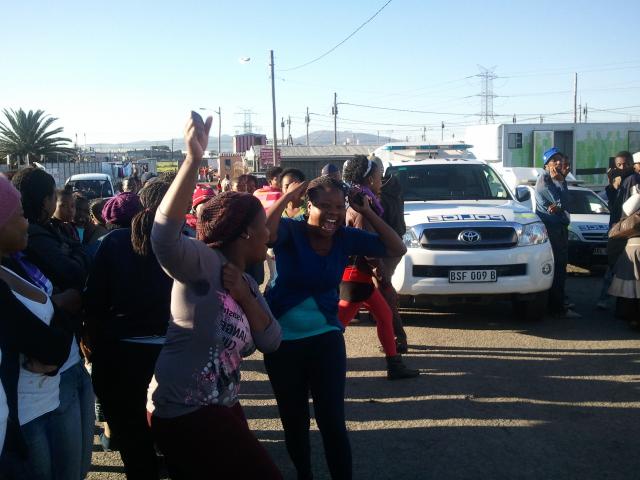http://www.iol.co.za/index.php?click_id=2822&art_id=nw20100521103952428C774943&set_id=
Gritty Cape Flats attracts fans
May 21 2010
By Mnadilakhe Tshwete
World Cup tourists are turning their noses up at posh city hotels to stay in the shacks of Blikkiesdorp.
The impoverished shack land has already welcomed a number of foreign visitors and now soccer-crazy fans have indicated they also want the gritty Cape Flats experience.
Jane Roberts, 53, has opened her shack for free to anyone who wishes to get a feel of the area dubbed Cape Town’s dumping ground – her only rule is that visitors must bring their own food.
Netherlands student Rosalie de Bruijn is her current guest and the 22-year-old says she read about Blikkiesdorp on the Internet last year.
“I saw the articles about the Temporary Relocation Area and wanted to come stay for a while,” she explains.
“Then two weeks ago, I got an opportunity to visit Cape Town and met Auntie Jane who said I could come and stay in her shack.”
Rosalie says the pictures she saw in her comfortable home in Holland don’t do justice to the horrible reality of Blikkiesdorp.
“It’s inhumane how people are brought to such a place but I see some are comfortable living here because they didn’t have any form of roof over their heads before relocating here,” she says.
Struggle
The Urban Studies student says she has had to adjust from the comfortable life she has back in the Netherlands to the pace of Blikkiesdorp where everything from fetching water and going to the toilet is a struggle.
Rosalie tells the Daily Voice washing in a plastic bucket is the most difficult challenge.
“I have to boil the water then put the basin on the floor, then I use a cup to pour water on my hair,” she says.
“It’s difficult but it’s an experience that I got to enjoy as I got used to it.
“But sharing a toilet with three other families is not right. I have to think twice before I go… I don’t go at night.”
The Dutch woman says she has also had a taste of Flats food.
“I’ve eaten a gatsby, curry, hot chips and also braai,” she says.
“I am also learning to cook the food.”
Rosalie has spent the past week visiting a Blikkiesdorp crèche and helped look after the toddlers.
“I even prepared lunch for them,” she says.
Jane, who lives alone, enjoys having Rosalie in her tiny tin shack home.
“We talk all night and we do things together,” says Jane.
“She watches while I prepare food for us and Rosalie also goes with me when I go help the community with problems.”
Jane says she is impressed with Rosalie’s down to earth attitude.
“She doesn’t act like a Dutch Queen, she even helps with house chores,” she says.
Jane says as the World Cup fast approaches, she has been inundated with requests from tourists who want to spend time in her shack.
“Since 2010 kicked in, people email through the Anti-Eviction Campaign and ask if I will let them come and see where we have been dumped,” she says.
“It’s been a blissful experience to have visitors come to my home.
“I’ve already had two ladies from England and others from France and Italy.”
The busy Delft woman is now expecting 20 foreigners next month.
“I won’t have enough space, my friends will have to accommodate them,” she says.
Jane is one of the original people evicted from the N2 Gateway houses in 2008.
She then moved to the pavement in Symphony Way for over a year before finally moving to Blikkiesdorp.
“The foreigners love being here with poor people,” she says.
Rosalie says the men seem keen to date her.
“I have been asked out by many men,” she says.
“A weird request was when a man asked to smell my hair.” – Daily Voice

